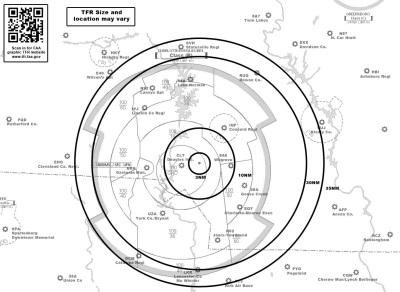Wed, Jun 29, 2016
Temporary Flight Restrictions Can Catch You By Surprise If You Don’t Pay Attention
Recreational flyers like to keep it simple and fun. This means we tend to fly in good weather and in familiar areas. Sometimes a weather briefing is as simple as using a computer, checking ahead by calling AWOS on the phone, or simply watching television, but are you sure you’re up to date on temporary flight restrictions (TFR’s)?

The national news has recently been giving extensive coverage to disastrous weather-related events. Examples would be the dry conditions in the western part of the U.S. causing major fires, and other parts of the country being inundated with the rain resulting in floods. Disastrous events life these commonly result in temporary flight restrictions with little previous notification.
We are also at the height of the political campaigning season, and when White House level travel takes place (and it looks like there will be a lot of it during the upcoming campaign), it is preceded and followed by a TFR. These types of TFR’s not only cover a specific area but, as in the case with presidential travel, the TFR can “roll” as the protected person changes location.
The point is, it’s simply not safe to assume you will not be affected by some sort of TFR at some time. There are a number of ways to find out where the TFR’s exist, but one of the easiest ways is to simply call the Lockheed Martin Flight Service and ask.
It’s common to think of Flight Service for weather briefings on a cross-country flight, but they can do lots of other things as well. There’s nothing wrong with calling the standard phone number of 1-800 wXBrief, and advising the briefer you simply want to know if there are any TFR’s that will affect your area of operation. You are not required to receive an entire standard weather briefing.
The briefer will need to know your airplane type and identification, or your name. They’ll also need to know your planned area of operation. It only takes a few minutes to make the check to assure you don’t end up on the evening news for your 15 minutes of shame. By receiving a briefing a record is kept that you called, and this could come in very handy if the TFR had not been properly posted or if it changed.
More News
He Attempted To Restart The Engine Three Times. On The Third Restart Attempt, He Noticed That Flames Were Coming Out From The Right Wing Near The Fuel Cap Analysis: The pilot repor>[...]
Make Sure You NEVER Miss A New Story From Aero-News Network Do you ever feel like you never see posts from a certain person or page on Facebook or Instagram? Here’s how you c>[...]
From 2009 (YouTube Edition): Leading Air Show Performers Give Their Best Advice for Newcomers On December 6th through December 9th, the Paris Las Vegas Hotel hosted over 1,500 air >[...]
Aero Linx: NASA ASRS ASRS captures confidential reports, analyzes the resulting aviation safety data, and disseminates vital information to the aviation community. The ASRS is an i>[...]
“For our inaugural Pylon Racing Seminar in Roswell, we were thrilled to certify 60 pilots across our six closed-course pylon race classes. Not only did this year’s PRS >[...]
 NTSB Final Report: Rutan Long-EZ
NTSB Final Report: Rutan Long-EZ ANN FAQ: Turn On Post Notifications
ANN FAQ: Turn On Post Notifications Classic Aero-TV: ICAS Perspectives - Advice for New Air Show Performers
Classic Aero-TV: ICAS Perspectives - Advice for New Air Show Performers ANN's Daily Aero-Linx (06.28.25)
ANN's Daily Aero-Linx (06.28.25) Aero-News: Quote of the Day (06.28.25)
Aero-News: Quote of the Day (06.28.25)



